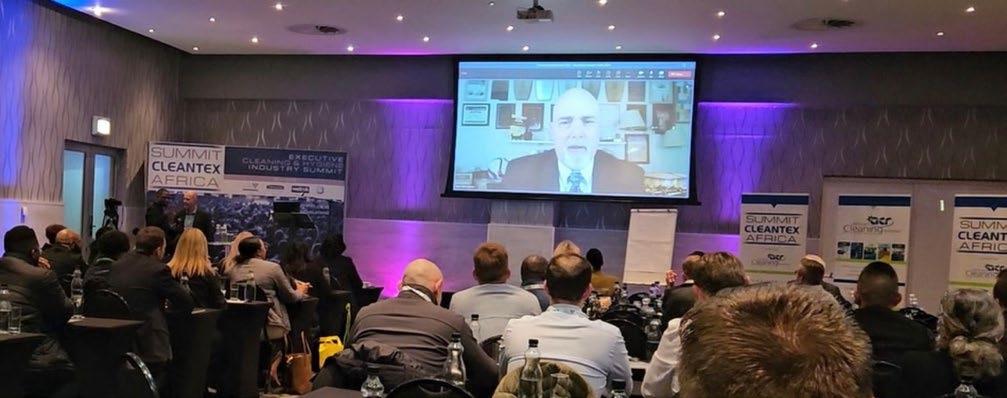
5 minute read
Sustainability in South Africa: Managing risks and making informed business decisions
Stephen Ashkin was the keynote speaker at the recent Cleantex Executive Summit held in Cape Town on 7 September. Entrepreneur and thought leader Steve Ashkin is widely considered the Father of Green Cleaning. In addition to having a long list of accomplishments and awards, ISSA, the Worldwide Cleaning Industry Association, recently recognised Ashkin as one of the most influential members of the cleaning industry over the past 100 years. In his address to cleaning professionals from Botswana, South Africa and Zimbabwe – a first for Africa, Ashkin who serves as president of the Ashkin Group, shared his vast knowledge and experience of sustainability in cleaning and his efforts to move the global cleaning industry from green to sustainable.
The term ‘sustainability’ is much more than just a buzzword. While earlier definitions often confined sustainability to environmental issues, it has now broadened to include social and organisational governance matters. This expansion recognises the intertwining of ecological, societal and governance issues and ultimately emphasises the importance of making informed business decisions.
At its core, sustainability is about managing risks, ensuring business continuity, and making informed choices based on a wider spectrum of considerations ultimately leading to greater profitability. Fundamentally, sustainability should simply be thought of as ‘smart’ business.
Sustainability and risk management
Every organisation, regardless of size, faces a variety of risks. These risks can be financial, operational or reputational, and they often become intertwined with environmental, social and governance (ESG) issues. By integrating sustainability into core strategies, businesses can proactively identify, assess and manage these potential threats.
• Environmental risks: Climate change, resource scarcity and environmental degradation pose significant threats to many sectors. For instance, a company heavily dependent on water might face supply challenges in a drought-prone region. By investing in water-saving technologies and practices, the company not only conserves a precious resource but also safeguards its operations from interruptions.
• Social risks: Social challenges such as labour issues, community relations and human rights can have direct and indirect impacts on a business. Companies that neglect their workers’ rights might face legal sanctions, strikes or boycotts, all of which can disrupt operations and tarnish reputations.
• Governance risks: Proper organisational governance is key to ensuring that a company operates with integrity and transparency. A lack of sound governance can result in financial discrepancies, unethical practices and decreased stakeholder and customer trust. Adhering to sustainability guidelines can help companies create a robust governance framework, thereby minimising associated risks.
Sustainability as a continuous improvement process
Much like the Green Cleaning Movement, sustainability is not a static endpoint but a journey of continual improvement. Markets change, technologies evolve and societal expectations shift. What may be considered sustainable today may not be sufficient tomorrow. This dynamic requires companies to be flexible and adaptive in their approach to sustainability. This dynamic also requires that companies act, and act now!
Specifically for the cleaning industry, ISSA – the Worldwide Cleaning Industry Association with its 10,500+ corporate members supporting 100 million cleaning personnel around the globe, has launched a member-led sustainability initiative. The initiative’s goal is to assist ISSA members when responding to sustainability requests from customers, as well as to help members implement sustainability, efficiency, social equity and other related business strategies in their own organisations. Here is the link to the application, which is free and will take less than 10 minutes to complete.
Sustainability: Beyond financial metrics
Traditionally, businesses have been primarily evaluated based on their financial performance. Now businesses are beginning to look beyond the balance sheet. They are keenly interested in understanding their and their supplier’s environmental stewardship, social responsibilities and the robustness of their governance structure. This shift underscores the importance of nonfinancial information in today’s business evaluations.
Sustainability acts as a comprehensive business framework addressing this non-financial information. It provides insights into a company’s broader impact and value, considering its ecological footprint, societal contributions and governance practices. Such a holistic view is instrumental in building trust and credibility among stakeholders.
Sustainability in South Africa
Furthermore, these issues and attitudes are not just relevant for companies based in the European Union, United States or elsewhere. South Africa has over the past few years been actively engaged with developing sustainability reporting requirements, especially due to the increasing demand for transparent and accurate reporting from the likes of the Johannesburg Stock Exchange’s (JSE) ESG reporting requirements, which have set standards for companies to disclose their ESG risks and opportunities.
The JSE is developing Sustainability Disclosure Guidance, including Climate Change Disclosure Guidance specifically tailored to the South African context. These guidelines aim to assist JSE-listed companies, institutional investors and other stakeholders in understanding the climate crisis, identifying risks and opportunities and linking sustainability disclosures to value creation.
While members of the cleaning industry may not directly report to the JSE, it is expected that reporting requirements will be driven by large customers. This is expected as South African companies are being urged to take action on sustainability because it will be mandated by local and international regulators such as the JSE, the International Sustainability Standards Board (ISSB), as well as the US Securities and Exchange Commission (SEC), among others.
In conclusion, sustainability is no longer a peripheral or optional consideration for cleaning businesses. It is central to managing risks, ensuring long-term viability and staying competitive in the market. Beyond its risk mitigation benefits, sustainability offers businesses a framework to measure their operations holistically, considering not just financial metrics but also the broader impact they have on the world. As the understanding and appreciation of sustainability continue to grow, the business strategies and decisions of tomorrow will inevitably be shaped. Cleaning companies that embrace and integrate sustainability into their core operations will undoubtedly be better positioned for enduring success in an ever-changing global landscape.










